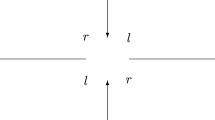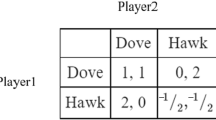Abstract
There are two general classes of social conventions: conventions of coordination, and conventions of partial conflict. In coordination problems, the interests of the agents coincide, while in partial conflict problems, some agents stand to gain only if other agents unilaterally make certain sacrifices. Lewis' (1969) pathbreaking analysis of convention in terms of game theory focuses on coordination problems, and cannot accommodate partial conflict problems. In this paper, I propose a new game-theoretic definition of convention which generalizes previous game-theoretic definitions (Lewis 1969, Vanderschraaf 1995), and which can be used to characterize norms of justice in partial conflict situations. I argue that the key structural property necessary for a social arrangement to be a convention is that it be conditionally self-enforcing, in the sense that: (i) each agent has a decisive reason to follow her end of the arrangement given that she expects all to do likewise, (ii) given a different set of expectations, some agents would have had a decisive reason to deviate, and (iii) these facts are common knowledge. This leads to a definition of convention as a strict correlated equilibrium (Aumann 1974) together with appropriate common knowledge conditions. Examples are given in which it is shown how this more general account of convention can be used to analyze norms of justice as well as coordination problems.
It is only a general sense of common interest; which sense all the members of the society express to one another, and which induces them to regulate their conduct by certain rules. I observe, that it will be for my interest to leave another in the possession of his goods, provided he will act in the same manner with regard to me. He is sensible of a like interest in the regulation of his conduct. When this common sense of interest is mutually express'd, and is known to both, it produces a suitable resolution and behavior. And this may properly be call'd a convention or agreement betwixt us,...
David Hume, A Treatise of Human Nature
And so it goes — we're here because we're here because we're here because we're here. Once the process gets started, we have a metastable self-perpetuating system of preferences, expectations, and actions capable of persisting indefinitely. As long as uniform conformity is a coordination equilibrium, so that each wants to conform conditionally upon coordination by the others, conforming action produces expectation of conforming action and expectation of conforming action produces conforming action.
This is the phenomenon I call convention.
Similar content being viewed by others
REFERENCES
Aumann, Robert: 1974, ‘Subjectivity and Correlation in Randomized Strategies’, Journal of Mathematical Economics 1, 67–96.
Aumann, Robert: 1976, ‘Agreeing to Disagree’, Annals of Statistics 4, 1236–1269.
Aumann, Robert: 1987, ‘Correlated Equilibrium as an Expression of Bayesian Rationality’, Econometrica 55, 1–18.
Binmore, Ken and Brandenburger, Adam: 1988, ‘Common Knowledge and Game Theory’, ST/ICERD Discussion Paper 88/167, London School of Economics, London, UK.
Brandenburger, Adam and Eddie Dekel: 1987, ‘Rationalizability and Correlated Equilibria’, Econometrica 55, 1391–1402.
Brown, G. W.: 1951, ‘Iterative Solution of Games by Fictitious Play’, in T. C. Koopmans (ed.), Activity Analysis of Production and Allocation, Cowles Commission Monograph, John Wiley and Sons, New York, pp. 374–376.
Carnap, Rudolf: 1947, Meaning and Necessity: A Study in Semantics and Modal Logic, University of Chicago Press, Chicago.
Crawford, Vincent: 1991, ‘An “Evolutionary” Interpretation of Van Huyck, Battalio and Beil's Experimental Results on Coordination’, Games and Economic Behavior 3, 25–29.
Fudenderg, Drew and Jean Tirole: 1991, Game Theory, The MIT Press, Cambridge, Massachusetts.
Gauthier, David: 1979, ‘David Hume: Contractarian’, Philosophical Review 88, 3–38.
Gilbert, Margaret: 1989, On Social Facts, Princeton University Press, Princeton.
Gilbert, Margaret: 1990, ‘Rationality, Coordination and Convention’, Synthese 84, 1–21.
Hume, David: (1740, 1888) 1976, in L. A. Selby-Bigge (ed.), A Treatise of Human Nature, rev. 2nd. edn, P. H. Nidditch (ed.), Clarendon Press, Oxford.
Jeffrey, Richard: 1983, The Logic of Decision, 2nd edn, University of Chicago Press, Chicago.
Kreps, David: 1988, Notes on the Theory of Choice, Westview Press, Boulder and London.
Kripke, Saul: 1963, ‘Semantical Analysis of Modal Logic’, Math Logik Grundlag der Math. 9, 67–96.
Lewis, C. I.: 1943, ‘The Modes of Meaning’, Philosophy and Phenomenological Research, 4, 236–250.
Lewis, David: 1969, Convention: A Philosophical Study, Harvard University Press, Cambridge, Massachusetts.
Lewis, David: 1981, ‘Causal Decision Theory’, Australasian Journal of Philosophy 59, 5–30.
Luce, R. Duncan and Howard Raiffa: 1957, Games and Decisions: Introduction and Critical Survey, Wiley Publications, New York.
Maynard Smith, John: 1982, Evolution and the Theory of Games, Cambridge University Press, Cambridge.
Maynard Smith, John and G. R. Parker: 1976, ‘The Logic of Asymmetric Contests’, Animal Behavior 24, 159–175.
Monderer, Dov and Dov Samet: 1989, ‘Approximating Common Knowledge with Common Beliefs’, Games and Economic Behavior 1, 170–190.
Myerson, Roger.: 1991, Game Theory, Harvard University Press, Cambridge, Massachusetts.
Nash, John: 1950, ‘Equilibrium Points in n-Person Games’, Proceedings of the National Academy of Sciences of the United States 36, 48–49.
Nash, John: 1951, ‘Non-Cooperative Games’, Annals of Mathematics 54, 286–295.
Savage, Leonard J.: 1954, The Foundations of Statistics, John Wiley and Sons, New York.
Schelling, Thomas: 1960, The Strategy of Conflict, Harvard University Press, Cambridge, Massachusetts.
Schiffer, Stephen: 1972, Meaning, Oxford University Press, Oxford.
Shin, Hyun Song: 1991, ‘Two Notions of Ratifiability and Equilibrium in Games’, in Michael Bacharach and Susan Hurley (eds.), Foundations of Decision Theory, Blackwell, Oxford, pp. 242–262.
Shubik, Martin: 1982, Game Theory in the Social Sciences, The MIT Press, Cambridge, Massachusetts.
Skyrms, Brian: 1984, Pragmatics and Empiricism, Yale University Press, New Haven.
Skyrms, Brian: 1990, The Dynamics of Rational Deliberation, Harvard University Press, Cambridge, Massachusetts.
Skyrms, Brian: 1996, Evolution of the Social Contract, Cambridge University Press, Cambridge, Massachusetts.
Sugden, Robert: 1986, The Economics of Rights, Cooperation and Welfare, Basil Blackwell, New York.
Vanderschraaf, Peter: 1995, ‘Convention as Correlated Equilibrium’, Erkenntnis 42, 65–87.
Vanderschraaf Peter: 1998, ‘Correlation and Convention’, unpublished manuscript.
Vanderschraaf, Peter: 1997, ‘Hume's Theory of Convention as Strategic Interaction’, unpublished manuscript.
Vanderschraaf, Peter and Brian Skyrms: 1994, ‘Deliberational Correlated Equilibria’, Philosophical Topics 21, 191–227.
von Neumann, John and Morgenstern, Oskar.: 1944, Theory of Games and Economic Behavior, Princeton University Press, Princeton.
Author information
Authors and Affiliations
Rights and permissions
About this article
Cite this article
Vanderschraaf, P. Knowledge, Equilibrium and Convention. Erkenntnis 49, 337–369 (1998). https://doi.org/10.1023/A:1005461514200
Issue Date:
DOI: https://doi.org/10.1023/A:1005461514200




